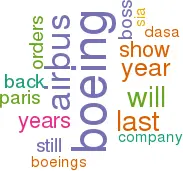Boeing is bouncing back
July 1999


The downturn in the aviation cycle was well illustrated at the Paris Air Show in mid–June by the fact that Boeing and Airbus both used the show for the first time to unveil their bullish long–term view of the market, the ones where they point to upwards of 15,000 jets needed by the world over the next 20 years (see pages 4–6).
The reason both chose to do this (did they confer? Is that allowed?) is that orders are relatively thin on the ground and neither had much to crow about. So far this year Airbus seems to be in the lead bagging orders, although of course Boeing’s sales of jets rolling out its hangars is still about double the level of those being made at Toulouse.
But Boeing nabbed the cheekiest sale of the show when it announced that it was selling some 777s to Singapore to replace some earlier A340s SIA has already ordered. Boeing was so keen to recover ground with this key customer (it lost out when SIA ordered the upcoming A340- 500/600s instead of 777s) that is has agreed to take the A340s off the carrier’s hands. This raises the delicious prospect of Boeing salesmen selling Airbuses at some point.
But this cheek is typical of the mood of rising confidence back in Seattle these days after a disastrous couple of years. The contrast between Boeing and Airbus at Paris could not have been more striking — Boeing is coming back and Airbus is still at odds with itself over becoming a real company.
At the last Paris gathering two years ago, Boeing Commercial Airplane Group was in denial about the problems building up in its factories. Its bombastic boss Ron Woodard boasted about the huge orders he was landing, while ignoring the fact that his suppliers could not keep up. By the end of that summer the story was out, and Boeing had to halt its lines. Last September at Farnborough Harry Stonecipher, Boeing corporation president, stood in for the fired Mr Woodard. He wore sackcloth and ashes, apologising to customers right left and centre.
Two years later ... a different story
This time in Paris, Boeing Commercial’s new boss, Alan Mulally, was rolling out figures to demonstrate how the company was getting back on track. By the end of this year his payroll will have shrunk by 34,000 since its peak last year; overtime is already down from the 25% needed to cope with the production backlog to an acceptable 9% today. Aircraft output is rising from 564 last year to 620 this year. Boeing’s margins are still well short of the 7/8% which Mulally is targeting, but they are improving.
The Seattle company’s problem is that it is trying to repair margins over the next couple of years just as the throughput starts to go down in line with the order downturn. As Boeing indicated last December, this will knock some $10bn off revenues and hurt profits down the line. But these headline numbers will only distract attention from the underlying improvement, which Airbus would be foolish to ignore.
It won’t, if its director Noel Forgeard has anything to do with it. At the show he repeated the mantra that has been heard several times since last November. The consortium’s biggest danger is that its success in landing orders leads to complacency, he said. Asked whether he would resign if the partners did not quickly re–start talks on converting Airbus into a single corporate entity (SCE), he replied with a Gallic shrug and bit of Descartian logic–juggling: “I say I will not resign because, no, it will not happen that way”. As he always insists, it cannot not happen. Decode all that and it is clear he is increasingly fed up with not being able to run Airbus properly as a true private–sector company and he will be off soon if nothing happens.
His greatest hope was the privatisation of Aerospatiale, as Aerospatiale–Matra would trigger a change of attitude there, removing the last obstacle to the SCE. But Yves Michot, boss of Aerospatiale Matra, was still chuntering on about Airbus being essentially “an industrial project” and the conversion being merely a “legal technicality”.
Forgeard disagrees: he sees proper centralised management leading to better supply chain control, lower inventories and higher stock turns, which could yield savings of more than $1bn a year. The way Boeing is going, he will soon need them if he is to sell any aircraft at a profit. Besides Boeing’s cost–cutting, the SIA deal shows that its is remaining aggressive on prices and deals.
BAe’s stiff upper lip
The biggest laugh of the show was Aerospatiale–Matra and British Aerospace pretending they were not upset at Dasa, part of DaimlerChrysler, buying Casa of Spain, thus making it the dominant partner in Airbus Industrie with 42.1%.
Dasa boss Manfred Bischoff confirmed shortly afterwards that Dasa was probably going to be floated off. Meanwhile British Aerospace and the French group are whispering in corners about getting together to counter–balance the Germans. Plus ca change …